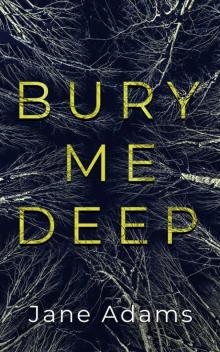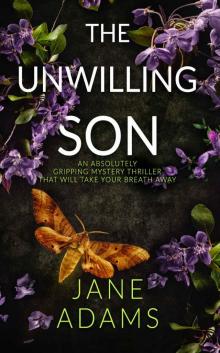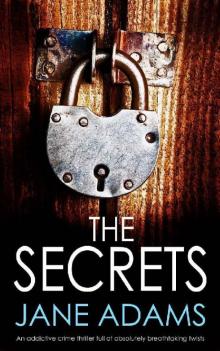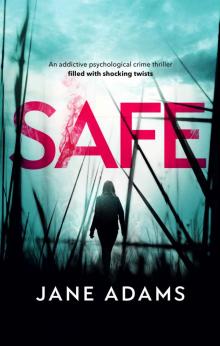- Home
- Jane Adams
Sugar Time Page 10
Sugar Time Read online
Page 10
“You mean you never saw them?” I couldn’t imagine what that would be like. Even when Ted and I couldn’t manage to be civil to each other, right after we split up, we made sure the kids weren’t dragged into our mishegas and that they had the closest thing possible to equal time with both of us.
“A month in the summer, sometimes a week at Christmas. We did guy things together so we didn’t have to talk very much—skiing, camping, diving. But the older they got the more they missed their friends and routines and the less a part of their life I was.”
“Where are they now?”
“Chris was in Saudi with Aramco, now he’s in Houston with Halliburton. And Evan’s an astrophysicist at Palomar. Chris got married a year ago—I haven’t met his wife, just got an announcement. I think he took the divorce the hardest. Evan and I e-mail back and forth pretty often, but it’s been a couple of years since I’ve seen him.”
I heard the echo of sadness in his voice. Although I vowed I wouldn’t be one of those women like some of Frances’ friends in Florida who sit around the bridge table and complain that they never hear from their kids unless they’re broke or in trouble, I get antsy if I don’t touch base with mine on a regular basis. I don’t need to know every detail of their lives, just enough to assure me that they’re okay. Lately I’d been talking to Jessie a couple of times a day—after all, who else but a grandmother is interested in the texture and color of a baby’s BM’s? And although Paul wasn’t as communicative as his sister, he stayed in touch, too; in fact, he’d called the day before, ostensibly just to say hello, but really because he was worried about me.
“Are you sure you’re not working too hard?” he asked.
“Of course I am,” I told him. “You know what it’s like—you lived through Going It Alone.”
“Yeah, except for that episode where the kid catches his mother in bed with a guy he’s never met,” he reminded me. “I barely survived that one.” He’d taken a lot of teasing from his friends because of the show, which was not, I told him a hundred times, about us—which of course, it was. “But seriously, Ma, you shouldn’t overdo it. After all, you’re not as young as you were then.”
“Of course I’m not. Out here they count your age in dog years, but relatively speaking I’m in pretty good shape for a 400-year old broad. Why? Do you know something I don’t?”
I don’t believe in all that woo woo stuff, but sometimes I wonder whether the umbilical cord that attached Paul to me for nine months still exists, somewhere in a parallel universe, binding us together now the way it did then. His “thing” reassures me—if there were something really wrong with me, I believe he’d know it. And if he did, he wouldn’t let my insistence that there was nothing deter him.
“Nope. Just checking,” he said.
“I’m fine, darling, really I am. Don’t worry about me. Now tell me about that girl you were seeing—Kelly, is it? Is it serious?”
“Don’t be one of those mothers,” he groaned. “If and when it is, I’ll let you know. You’re sure you’re okay, huh?”
“I’m sure,” I said. “Besides, you’d know if I wasn’t.”
I’d told Alex about Paul’s “thing” in one of our e-mails, and it fascinated him. “Did you ever have him tested?” he wrote back.
“No—Ted wanted to, but you know how kids are, he didn’t want to be different. He says it’s not something he can control—it comes and goes, and it’s only about us, not other people. His best friend in high school had leukemia, and he never had a clue until Josh went into the hospital,” I typed.
“If he ever changes his mind, let me know. My former brother-in-law is a psychologist at Baylor. He’s been doing research along those lines.”
The next time we talked, I mentioned the brother-in-law. “You’re still friendly?” I asked.
“Sort of,” he replied. “We have dinner together a couple of times a year when I’m in Houston.”
“Is that where you met your wife?”
“No, we grew up in the same town.”
“Oh?” Now we were getting to the good stuff. I could have cared less about her brother; I wanted to know about her.
“Did she want out of there, too?”
“Not quite the way I did. Her father didn’t work in the steel mill—he owned it. As you can imagine, he wasn’t exactly thrilled when she brought me home.”
It was like one of those star-crossed young lovers movies from the fifties—Splendor in the Grass meets A Summer Place. I was already casting it in my mind.
“Were you crazy about each other?”
“Well, we were crazy, anyway. We got married on the field at half time during my first Oilers game. She called her folks an hour before and told them to watch.”
I could hear the ice cubes tinkling in the glass. “I wanted her,” he said. “She was this fantasy of mine, the blonde princess in the castle on the hill—no kidding, it was this huge Tudor thing, a real castle. So I took her away and bought my own castle—actually, it was a split level—and put the princess in it.”
“Except you didn’t live happily ever after,” I said softly.
“No, we didn’t. Except I didn’t get that till I came home one night and my key wouldn’t work in the front door.”
“Quite a way to find out,” I murmured.
“I’ll say. I had no idea. We hadn’t been fighting or anything—in fact, that morning before I left we’d even made—I’m sorry. That was probably in the category of too much information. Or too much scotch. Or you’re too good a listener. Or all of the above.”
You can be the best listener in the world, but if a man doesn’t want to talk it doesn’t matter. That night, though, Alex was in a ruminative mood, and I was all ears. “I was a lousy husband,” he said after a while. “I don’t mean I, you know, fooled around or anything. I was so involved in what I was doing, what I was trying to do, I just didn’t notice how unhappy she was.”
I wondered what he would have done if he had, but I didn’t ask. I’d told him that night at Morton’s that I’d been divorced for a long time, to which he’d, responded “My good luck, his bad.” It hadn’t sounded like a line, not the way he said it, and it felt sincere and spontaneous. Or maybe I just wanted to think so…of course, I believed Bill Clinton when he said he didn’t have sex with that woman, too.
All that personal stuff came in bits and pieces over the weeks before we started shooting. E-mail is a truly wonderful thing, and so are cell phones with no roaming charges. He called me once from Paris, where he was trying to lure some rocket scientist to come to work for him, and another time from Sydney, where he skipped out early during a symposium on the human genome project and went scuba diving on the barrier reef, which I gathered was the Mount Everest for divers. “God, Sugar, you’d love it. One of these days we’ll have to get you underwater. It’s a whole different world down there.”
“It’s just like L.A. only the sharks don’t have law degrees,” I said. “The idea of breathing through a tube while Jaws circles around me terrifies me.”
“We won’t go anywhere there are sharks, I promise,” he countered, and that was all he said about that. If ‘one of these days’ ever rolled around—if things progressed to the point where we actually went somewhere together—I’d prefer Paris or Barcelona—I look better in a little black dress than a bathing suit.
Very quickly, it seemed, Alex Carroll had become a familiar presence in the landscape of my mind. Often I caught myself wondering where he was, what he was doing. I looked forward to his phone calls and checked my email more than usual in case he’d written. Once three days went by without hearing from him. “Do you think this means it’s over?” I asked Carrie.
“How can it be, it hasn’t started yet?” she said. “Just kidding, Sugar, you’ll hear from him, I know you will. Relax.”
The next best thing to talking to Alex was talking to the girls about him. They didn’t tell me not to get carried away or caution me that he probably had some fa
tal flaw—on the contrary, they were almost as pleased as I was. “Sugar Carroll—it has a nice ring to it,” said Carrie. “Are you doodling it in your notebook yet?”
“Not quite, but close,” I told her. “Fortunately, I’ve got a show to get on the air.”
“Rich and single,” said Suzanne. “Don’t let him get away.”
“Don’t do that thing you do,” warned Peggy. “You know, the if-he-likes-me-this-much-there’s-probably-something-wrong-with-him thing.”
But when he asked me to stop over in Seattle on my way to Vancouver, I hesitated.
Preproduction was almost complete; rehearsals were going well, and although we’d make small changes in the shooting script up to and including the first day of principal photography, we’d be ready to start in less than a week. Alex broached the subject of coming to visit him in an email, which gave me time to think about it—and of course, to canvas the girls.
“You don’t have to analyze it to death,” said Carrie. “You meet a guy, he seems nice, you get to know each other, he’s just what he seems to be, and he likes you.”
“Or he isn’t, or he doesn’t.”
“So? You’ve survived worse in the man department.”
“Let me count the ways,” I sighed. “Seriously, though—”
“That’s the problem. You’re taking it too seriously. Go now, worry later. Have a good time. Get laid, for God’s sake!”
Suzanne said the same thing, but more frankly. “Listen, Sugar, these days you really are more likely to get blown up by a terrorist than find a guy. And before they fly a plane into your bedroom, you better get your ass in gear. He sounds nice. Rich, too, which doesn’t hurt, believe me.” Suzanne married poorly but divorced well. Her first husband—she never remarried, but she always refers to Greg as her first husband—was a TV news anchor who’s been paying her a third of his salary since forever, the price she exacted when he threw her over for a pretty blue-eyed blonde reporter who looked remarkably like Suzanne did two children, twenty-five years and that many pounds ago. Matthew, with whom she’s lived for several years, is a poet, painter and raconteur who tends bar at Odeon to keep himself in Zegna shirts and hand-tooled boots; As Suzanne says, unlike Greg he’s always in a good mood, is nice to people even if they can’t advance his career, and most important, he thinks she hangs the moon.
Peggy, as usual, hit the mark closer than Carrie or Suzanne. “What are you afraid of?” she asked. “That something good might happen? That he might turn out to be the One? And that he might walk out with your stuff?” We’re all captives of our own romantic history, and mine is one of struggling between the urge to merge, to lose myself in a man, and the equally powerful yen for independence. If there’s a middle ground, not the quicksand of intimacy that can disappear you or the hard-packed earth where your footsteps leave no trace, I haven’t found it yet.
“You know me, I’m just a simple bitch wid’ a bad attitude,” I said.
Peggy sighed. “Well, leave it home and go. If he turns out to be a jerk, so what?”
“What if he doesn’t?”
“You’ll think of something else to worry about.”
I hadn’t told Alex exactly when I was arriving, only that I’d be checking into the W late in the afternoon, so I was surprised to see a limo driver holding up a sign with my name outside of baggage claim. “Mr. Carroll sends his regards, Ma’am,” he told me. “He said he’d see you at six.”
When I got to the hotel, the concierge handed me a note saying the same thing. A bellhop took my luggage and led me upstairs to my room, where a gorgeous flower arrangement, a basket of fruit and cheese, and a bottle of Chateau Ste. Michelle chardonnay awaited me. A nice beginning, I thought; maybe this wasn’t such a crazy idea after all.
It was a mild day and the sun was shining, so I put on my walking shoes and set out to explore. I’d been in Seattle once before, when Jessie was looking at colleges, but I hadn’t seen much of the city, so I headed down to the waterfront and strolled past the old wooden piers that jutted out into the bay. In front of the aquarium a little boy jumped up and down with excitement—“Me going to the fishie zoo!” he told every passer-by as his mother struggled to collapse his stroller. I passed clam bars and souvenir shops, ferry terminals and restaurants, a dock where Sikhs in wrapped turbans leaned against their cabs smoking while they waited for passengers to disembark from the Victoria hydrofoil. The day was warm for early April; in the park the trees had greened up, the azaleas were blooming, and tight little buds had formed on the roses. Two teenage boys were playing Frisbee in a graveled crescent between two parallel walkways, one for wheeled traffic and the other for pedestrians. Elderly couples strolled arm in arm, skaters and bikers whizzed past on a sinuous trail, and the air was fragrant with salt-tinged breezes and freshly blossoming trees.
I made my way down to a small beach where dogs chased sticks and balls into the water and a couple of teenage girls blithely ignoring the surgeon general’s warnings held their aluminum-shaded faces up to the sun. Taking a seat on a peeling log deposited on the beach by a long-ago storm, I lit a cigarette and thought about all the things that could possibly screw up the shoot or go wrong in postproduction, thus sinking our chances of getting a series out of the pilot, even a commitment for a short season.
My anxieties inevitably terminate in a worst-case scenario, which tends to calm them by reminding me that even a fuck-up of unimaginable humungousness that meant I never got a job in the business again wasn’t a death sentence. I’d survive—I wouldn’t starve, the people who love me still would, and screw the others, and I’d still have my health, family, and sense of humor.
Well, my sense of humor anyway. I wasn’t so sure about my health. As a matter of fact, I’d been feeling shitty for most of the last week. It wasn’t anything specific, just a transient tightness in my chest or occasional dizziness when I stood up after I’d been sitting in one place for a while. I hadn’t been sleeping well, and I had new aches and creaks in places I hadn’t, before.
That’s the thing about getting older—you don’t know if what you’re feeling is just because you are, or it’s symptomatic of something else. Like a heart condition.
Let’s not go there. Not now. Let’s think about something pleasant, like Alex Carroll. And then my heart quickened—it really did, the same fluttery feeling you get when you’re pregnant and the baby moves for the first time, just a little higher up and to the left. Only I didn’t need a doctor to tell me I was fine.
On the way back to the hotel I passed an elegant looking lingerie store; on an impulse I went inside. According to show biz legend, the great impresario Flo Ziegfeld insisted that all the showgirls in his follies wear silk beneath their lavish costumes. “But Mr. Z., why throw away money on something the audience doesn’t even see?” asked his accountant. “Ah, but the ladies feel it, and that’s what the audience sees,” he replied.
When I came out of the shop my wallet was a lot lighter and so was my mood. I hadn’t bought new underwear for a man in a long time—not since Jan.
When I met Jan I was in a particularly zaftig phase—not just overstuffed in places, which I’ve always been, but spilling dreaded back fat out of my 36C wonder bra and excess flesh over the waist of my size 10 jeans. Ten certainly isn’t skinny—in Los Angeles it’s considered obese—but after Paul was born I said goodbye to single digit sizes in everything but shoes. That was the beginning of my shoe jones, because even when nothing else fits, they do.
But Jan loved my fleshiness. The day after the night we first slept together we went to a Modigliani exhibit at the Met, and he drew me into an adjacent gallery featuring the pendulous, full-bodied sculptures of Gaston Lachaise. “I like these better than those,” he said as we stood in front of a series of drawings, studies for the large bronze that dominated the room. “They’re his wife, Isabel. I think they’re beautiful.”
“Really?” I’m always interested in who and what men find beautiful—personally, I think
it all has to do with their mothers, but since I’d never met Jan’s I could only speculate.
“Picasso said, you give a man looking at a picture everything he needs—breasts, hips, legs—and he’ll put everything where it belongs with his own eyes. He’ll make the kind of body he wants.”
“And you’d make…her?” We gazed at the huge bronze sculpture, and he ran his hands lightly down my body, as if tracing its outline. Then he turned me around so my back was to the other couple in the gallery, putting one hand on my breast and cupping my sex with the other. Through the thin fabric of my skirt his thumb found one cleft and his middle finger a different one. An “Oh!” of surprise escaped my lips; my thighs loosened and my knees went weak. I would have fallen if he hadn’t cupped my crotch more firmly and pulled me against him. “I’d make you,” he murmured into my ear.
Alex Carroll probably preferred Modigliani, but there was nothing I could do about that so I took a long, hot bath, liberally softened with Bliss lemon and sage-scented oil thoughtfully provided by the hotel, and slathered Body Butter all over me. Then I took the tags off my new purchases and slipped on the filmy, lace-trimmed La Perlas before inspecting myself in the full-length mirror on the closet door. At a certain point in life, you don’t undress for romance, you drape for it, concealing your flaws and hoping for the best. I didn’t know if Alex Carroll would be watching when I disrobed that night, but just in case, I was ready.
I saw him in the lobby before he spotted me. He looked even better than I remembered, in a three-button black cashmere blazer over a charcoal striped collarless shirt and gray flannel slacks. A smile lit up his face as I approached—he held out his arms and I stepped easily into them, close enough to accept a friendly kiss on the cheek before I leaned back to look at him; damn, those eyes were something else.
“Hey there, Sugar, “he said. His faint drawl stretched out the words—his voice, familiar from our phone conversations, was deep and melodious. “I’m really glad you decided to come.”

 The Greenway
The Greenway Detective Mike Croft Series Box Set
Detective Mike Croft Series Box Set BURY ME DEEP an utterly gripping crime thriller with an epic twist (Detective Rozlyn Priest Book 1)
BURY ME DEEP an utterly gripping crime thriller with an epic twist (Detective Rozlyn Priest Book 1) Sugar Time
Sugar Time THE UNWILLING SON an absolutely gripping mystery thriller that will take your breath away
THE UNWILLING SON an absolutely gripping mystery thriller that will take your breath away THE APOTHECARY’S DAUGHTER an absolutely gripping crime thriller that will take your breath away
THE APOTHECARY’S DAUGHTER an absolutely gripping crime thriller that will take your breath away The Secrets
The Secrets Safe
Safe